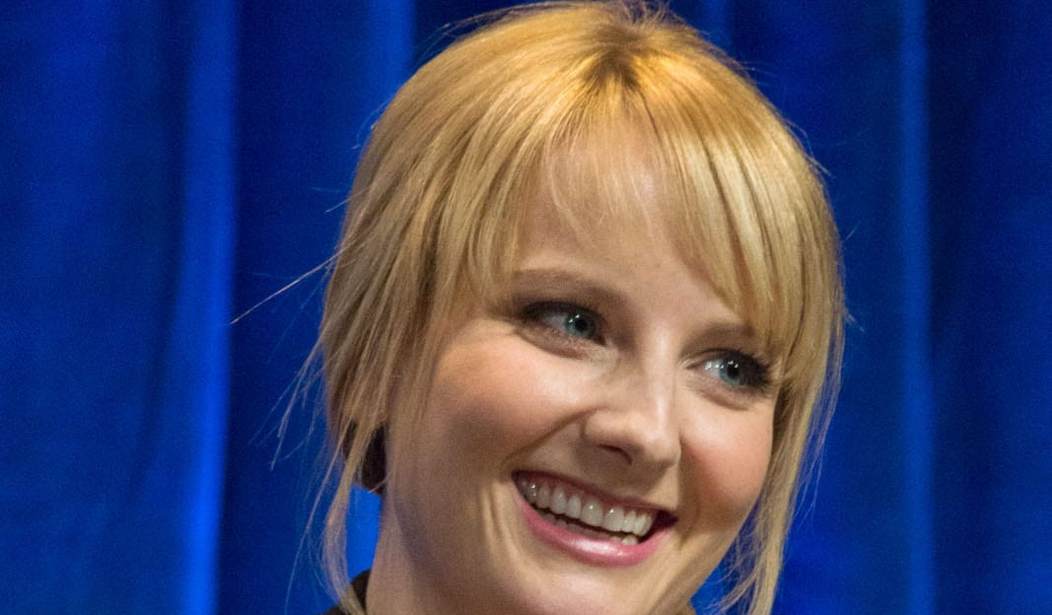Melissa Rauch, otherwise known as Bernadette on “The Big Bang Theory,” just made the exciting announcement that she and her husband Winston are having a baby! Her announcement did not come with the usual pomp and circumstance, however. Instead, she shared that her first pregnancy ended in a heartbreaking way.
In an article for Glamour, she shares:
Here is the only statement regarding my pregnancy that doesn’t make me feel like a complete fraud: Melissa is expecting… she is extremely overjoyed, but if she’s being honest, due to the fact that she had a miscarriage the last time she was pregnant, she’s pretty much terrified at the moment that it will happen again. She feels weird even announcing this at all, and would rather wait until her child heads off to college to tell anyone, but she figures she should probably share this news before someone sees her waddling around with her mid-section protruding and announces it first.
Melissa hopes that by sharing about her loss others can learn more about the impact of miscarriage and consider how they speak to women who may be going through the same heartache. With this announcement in the news, it seems like a good time to have a discussion about miscarriage, so here are a few thoughts:
Losing a child hurts. This loss is well summarized by Melissa as “one of the most profound sorrows I have ever felt in my life.” She describes “the image of our baby on the ultrasound monitor—without movement, without a heartbeat—after we had seen that same little heart healthy and flickering just two weeks prior completely blindsided us and haunts me to this day.” On experiencing the day of her due date: “A day I had once marked on my calendar with such excitement was now a memorial of a crushed dream.” Then, her path to recovery took longer than she expected. “What I realized… is that there really is no template for how to process these emotions. You’re not necessarily going to a funeral or taking time off of work to mourn, but that doesn’t change the fact that something precious has been unexpectedly taken from your life.”
You are not alone. I recall a friend sharing on social media of her pregnancy a few years ago. Several weeks later she had to share the update that they had lost the baby. As I read the comments I was overwhelmed at seeing how many women had experienced a similar loss. Melissa encourages women to talk about miscarriages, noting, “Ideally, the more we talk about the issue, the more we can chip away at the unnecessary stigma around it, with the end result being that those of us struggling with loss and infertility will feel less alone.”
A miscarriage is not your fault. “You did nothing wrong” is an important admonishment from Melissa. She shares of her “futile exercise of mentally replaying every day of the pregnancy up until that point over and over again, wondering whether there was something I did that could’ve cause the miscarriage.” She reminds all women suffering from these feelings that “You did nothing wrong” and encourages them to practice kindness toward themselves. “I came to understand that thoughts like that have no productive place in grief.” She admits she spent too much time being a “big jerk to myself” and encourages others to remember: “It is OK to not to OK right now.”
Seek help when you need it. “During this time. I was continually surprised by the constant assault of emotions—and how severely unlike myself I felt.” She explains that the change in hormones shocked her the most. “In retrospect, it would’ve helped me to be aware that many women essentially go through a form of postpartum depression after miscarriage, without a baby to show for it.” Unfortunately, it was after she experienced these emotions that she learned there are ways to help ease the pain. Melissa writes, “The sadness is hard enough; the least we can do for ourselves is talk with the medical professionals in our lives about ways to alleviate the hormone plunge that occurs after pregnancy loss.”
Stop ovary-probing. In our society, it is common practice to ask women of childbearing age when they will have a baby, an act which Melissa calls “Ovary-probing.” “’Are you pregnant?’ ‘When are you going to have a little one?’” She hyperbolizes with “You’re getting up there, you worthless old empty baby dispenser… isn’t it time you breed already?” While it seems innocent enough to ask about when someone will procreate, we need to stop and consider what heartache such a question could dredge up. As Melissa reminds us, “Whether a woman wants to have children or not, if she wants to share that information, she will.”
Why she shared her pain. “My hope is that, if we as a society become more aware of how common fertility struggles are, perhaps we won’t be so cavalier in questioning females about what’s on their baby agenda.” Melissa tells us, “Due to reasons beyond anyone’s control, miscarriage is estimated to occur in anywhere from 15 to 20 percent of recognized pregnancies.” With numbers that high, chances are you know women who have experienced this loss, whether they have told you about it or not.
Melissa concludes her article by stating “All I really know for sure is that this experience has changed me forever.” She notes that this loss has taught her many things. “But to be honest,” she says, “I would’ve much preferred to learn said lessons from either a fortune cookie or by watching a few heartfelt reruns of Full House.” The next time you want to talk to a woman about her plan for children, stop and consider the lessons Melissa Rauch had to learn the hard way.









Join the conversation as a VIP Member